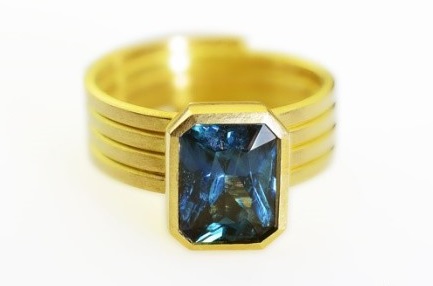Christmas is one of the most popular times to propose, so whether you’re researching the latest styles because you are waiting for that special someone to pop the big question, or you’re just curious and want to treat yourself to the ultimate luxury gift, now is the time to think more deeply about where the gold in your fine jewellery came from.
We’re all increasingly conscious about not making the world’s problems worse but, with the jewellery industry still so opaque and associated with complicated supply chains, it can be hard to know how to pick a responsibly sourced jewel that you’d be proud to wear as a symbol of beauty, love and commitment.
David Finlay, Senior Responsible Minerals Manager at the Fairtrade Foundation says: “Every year, we spend almost $300bn on jewellery. Most of us do have some awareness that behind all the shine lie real concerns about the sometimes brutal conditions under which gold is extracted, but if more people acted on this and looked for Fairtrade gold, we could help change the lives of so many miners”.
An estimated 100 million people worldwide rely on small-scale mining to support their families and communities. That’s the second largest sector in the world after agriculture. Fairtrade works exclusively with artisanal and small-scale miners.
In non-Fairtrade small-scale gold mine sites, miners can work in dangerous conditions with little or no health and safety equipment. Miners extract gold using toxic chemicals such as mercury and cyanide. The use of these chemicals can cause birth defects, brain and kidney damage, and can contaminate water supplies, entering the food chain through poisoned fish. They simply can’t afford to use safer processing methods. High levels of poverty in small-scale mining communities mean children are often forced to work to help increase their family income.
But it is possible to seek out some beautiful designs made from gold sourced from artisanal and small-scale mines that are not associated with human rights violations and environmental pollution.
Fairtrade is working with nearly 50 artisanal and small-scale miner sites in Peru, Kenya, Uganda and Tanzania and 70 jewellery brands, and over 300 designer makers, have signed up to sell Fairtrade gold in the UK.
Check out Fairtrade Gold pioneer Harriet Kelsall’s jewellery collection and make a positive difference through your purchase. Or take a look at beautiful engagement rings at Cred Jewellery. For something extra special and bespoke, visit Anna Loucah who handcrafts each of her unique pieces.
Fairtrade is one of the most recognised standards globally for supporting improvements with artisanal and small-scale mines. Tackling unfair pay and dangerous working conditions, Fairtrade gold has strict requirements on health and safety, handling chemicals and environmental protection. Workers in Fairtrade certified gold mines receive a guaranteed Minimum Price for their gold as well as an extra amount of money on top, called Fairtrade Premium, to spend on improving their businesses and community.
Fairtrade is the most widely recognised ethical label in the UK and one that has paved a more conscious way of shopping since the Mark was first launched in the UK 25 years ago. Over 90% of British people recognise the Fairtrade Mark and 84% of people trust the Mark. It is the only certification scheme to focus on price and Fairtrade currently works with 1.6 million producers across 74 developing countries, providing a safety net against volatile market prices.
Find out more about Fairtrade gold and where to buy Fairtrade gold jewellery.
-Ends –
For more information, interviews or images, contact martine.parry@fairtrade.org.uk Tel: 07886 301486.
Our top five picks
Hexagon Halo Diamond Engagement Ring by Cred Jewellery
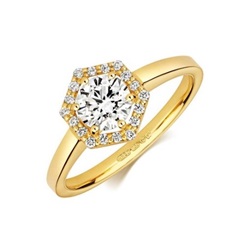
Featuring a 0.50ct Ethically Sourced Round Brilliant Cut Diamond and Delicate Geometric Halo. 2mm wide band. The diamond is certified G-H SI. If you wish to upgrade your diamond quality, please contact us. This is the Allium Ring – 18ct Fairtrade Gold and Lab grown Diamonds – £2,600.
Malawi Blue ring by Cox & Power
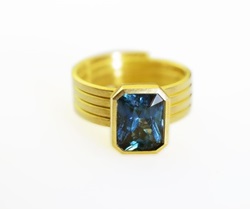
Each Cox & Power Ribbon ring is made with a single piece of Fairtrade Gold twirled like a ribbon twist. Gold from Peru with a single sapphire, deep-blue night-sky with hints of the deep. A Rose-cut diamond, mysterious in colour and gentle sparkle as if fallen from the sky on a ribbon of gold that wraps around the finger.
Jamie Ring by Lebrusan Studios
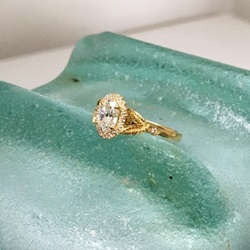
This show-stopper is a bespoke engagement ring crafted with 18ct Fairtrade Yellow Gold and set with a 0.71ct traceable Canadian diamond. Arabel Lebrusan’s talent for realising others’ visions enabled Jamie to bring his dreams to life. One of the UK’s first ever Fairtrade Gold licensees, Arabel prides herself on designing timeless and unique engagement rings whose ethically-sourced materials ensure that they are just as beautiful on the inside as they are on the outside.
Summer Meadow ring by Jon Dibben
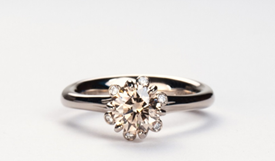
18 ct Fairtrade gold Summer Meadow ring set with a 1.12ct natural pale brown diamond. To celebrate Fairtrade UK’s 25th anniversary, Jon Dibben are offering a reduction of 25% from some of our pre-Fairtrade gold pieces. Allowing us to free some space for Jon’s new collections and invest in more Fairtrade gold! Contact us, or follow us on facebook, or Instagram for more details.
Ingle & Rhode’s La Stravaganza
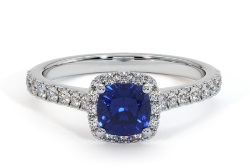
Meaning ‘The Extravagance’, the La Stravaganza is a stunning design, named after an extraordinary piece of music by Vivaldi. Featuring a stunning centrepiece gemstone surrounded by a halo of micro-pavé diamonds, with further micro-pavé diamonds set on the shoulders. Here set with a 1.12ct royal blue cushion cut Sri Lankan sapphire and approximately 0.4ct of round brilliant cut Canadian diamonds in the halo and shoulders. Ingle & Rhode can make a La Stravaganza ring for you in recycled platinum or Fairtrade gold and set with the gemstone of your choice.
-Ends –
Notes to Editors
- Mining is one of the worst forms of child labour. High levels of poverty in small-scale mining communities mean children are often forced to work to help increase their family income. The International Labour Organisation lists mining as one of the worst forms of child labour because it is dangerous and demanding.
- Only mines that do not use child labour can be Fairtrade certified. Miners working in Fairtrade certified mines must put a Child Protection Policy in place and work to prevent child labour.
- Global sales of gold are worth $140 billion per year. Global sales of gold are equal to 3,500 tonnes per year – that’s worth around $140 billion! Fairtrade Gold is the most precious commodity Fairtrade is working in and is worth $40,000 per kilo in the global market.
- Fairtrade works to ensure that miners get a fair share of this value and an additional $2,000 per kilo as a premium payment. Miners can reinvest the Fairtrade Premium as they choose, whether that’s in their community, or to improve their business and work their way out of poverty, building better futures.
- 60% of gold used annually comes from newly mined sources. The rest is from recycled supplies such as old jewellery that has been melted down. In conventional gold supply chains, newly mined and recycled gold is mixed when it is refined. This makes it impossible to tell the origin of metal in an item of jewellery or other gold product.
- Fairtrade Gold can be traced from the mine through the refining process and into finished products. This is backed up by documentation of all transactions between miners and licensed jewellers. It means consumers and jewellers know that the gold in products carrying the Fairtrade Gold Stamp comes from a socially and environmentally responsible source which has economic benefits for miners.
- Jewellery accounts for the single largest use of gold in the world today. Mined in dangerous conditions with devastating environmental impacts, jewellery is plagued with ethical concerns.
